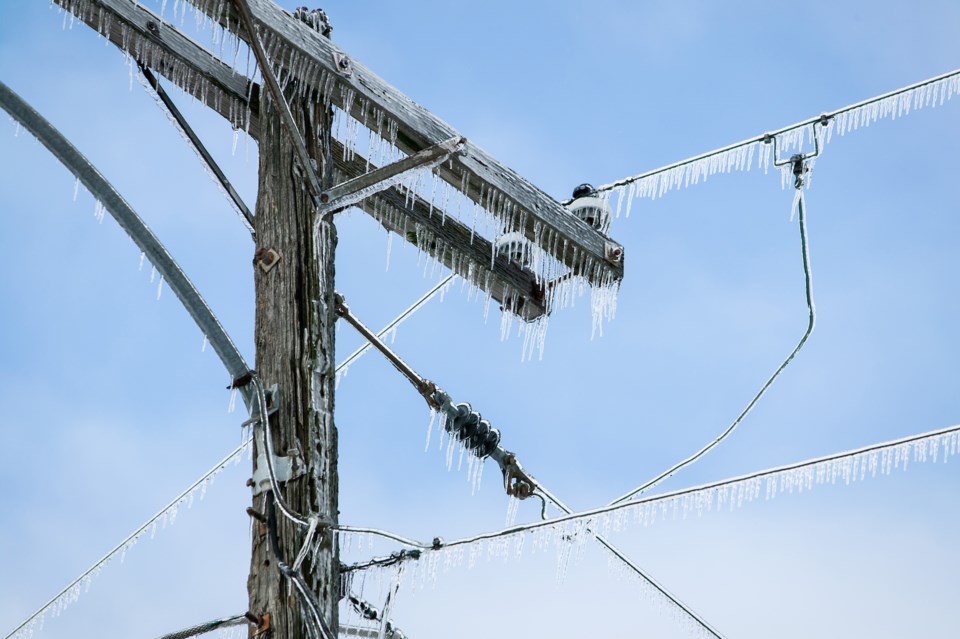Travel is not recommended today and road closures are likely due to significant ice build-up from freezing rain that will continue into this morning, said Environment Canada in its 4:22 a.m. weather alert Monday, Dec. 30.
The alert covers Newmarket, Georgina, northern York Region, Uxbridge, Beaverton, and northern Durham Region.
Ice accretion, or build-up, up to 20 mm is possible and strong wind gusts of 40 to 60 km/h are expected, which could contribute to extended and widespread power outages.
The ice storm will end late this morning, the weather service predicts.
Freezing rain will transition to rain or drizzle by late morning.
Hazardous travel conditions have been reported on area roads and highways.
In the event of a power outage, here are some tips from the Regional Municipality of York’s emergency preparedness guide to help you prepare:
Before the power goes out
- Use surge protectors to protect valuable electronics like computers and home entertainment systems
- Know how to safely shut off your electricity, water and gas (and if any special tools are needed) Keep your vehicle with no less than a half tank of gas because gas stations are electrically operated and won’t work during a power outage
- Have back-up light sources such as flashlights with batteries in all major rooms of your house
- Have a corded telephone that will work without home power (cordless phones will not work without electricity)
- Know how to release your electric garage door opener and how to open the door without electricity (some openers have a battery back-up)
- Have a cooler on hand that can be filled with ice or freezer blocks for cold food storage if needed If you depend on home oxygen (or other life-sustaining equipment), have a back-up that does not rely on power (such as battery back-up). Contact your service provider for options
During a power outage
- Never use outdoor grills, smokers or barbecues indoors (fire hazard and they release deadly carbon monoxide gas)
- Never operate any fuel burning equipment (including generators) inside your home, basement, garage or other enclosed area
- To keep food cool, limit the number of times you open the refrigerator, unless absolutely necessary
- Use camping equipment in a space away from where you live and sleep, and be sure to store fuels safely
- Turn off appliances not required (electric range and washer/dryer), as appliances left on during an outage will start up when electricity is restored
- Use safe candle holders — never leave burning candles unattended — if using candles for heat and light
Portable generator safety
- Always read the owner’s manual before operating
- Always keep your generator outdoors and away from doors and windows
- Always use a proper rated extension cord (in good condition)
- Never add fuel while it is running (fire hazard)
- Never connect to a wall outlet (very dangerous when power is restored)
When power is restored
- Only turn on what you need to give the system a chance to stabilize
- Check your fridge and freezer for spoiled food (discard immediately)
- Don’t risk eating spoiled food
- Reset your clocks, timers and alarms (replace any items used from your home emergency kit)
Driving during a power outage - four-way stops
- A traffic light intersection becomes a four-way stop when signal lights are not working
- The first vehicle to arrive and stop has the right of way
- If two or more vehicles stop at the same time, the vehicle on the right has the right of way, meaning it proceeds through the intersection first
- Shortly after a power outage, stop signs may be temporarily placed at many designated traffic light intersections
- Stop signs override the four-way stop rule and create a two-way stop instead
For information on Newmarket-Tay power outages, call 905-895-2309 or visit here.
To report severe weather, send an email to [email protected] or tweet reports using #ONStorm.



